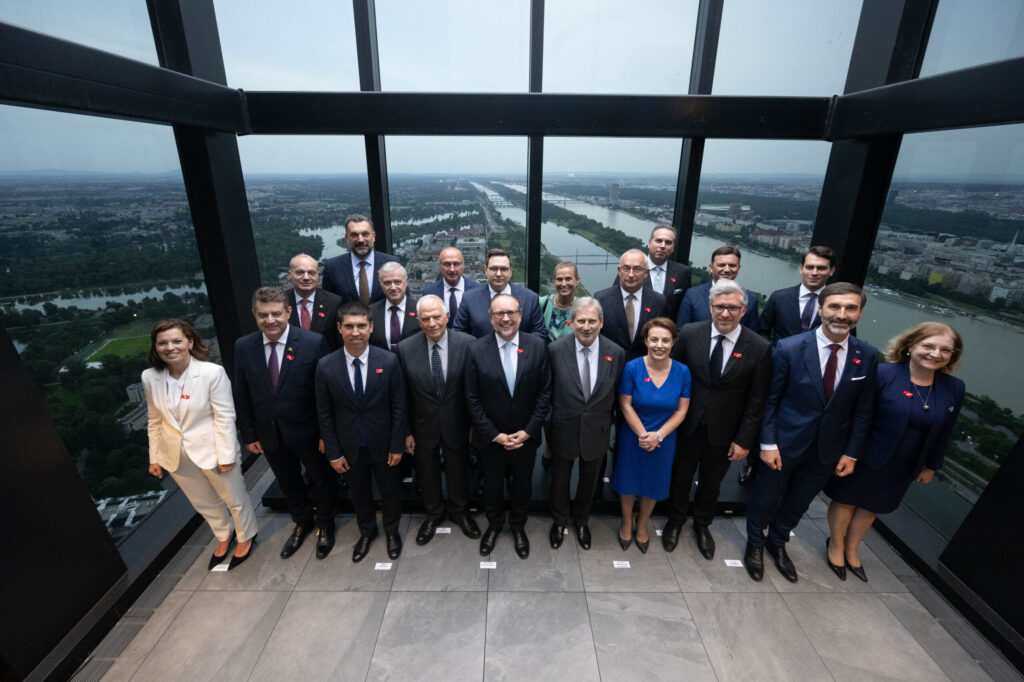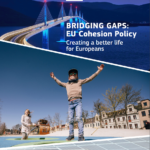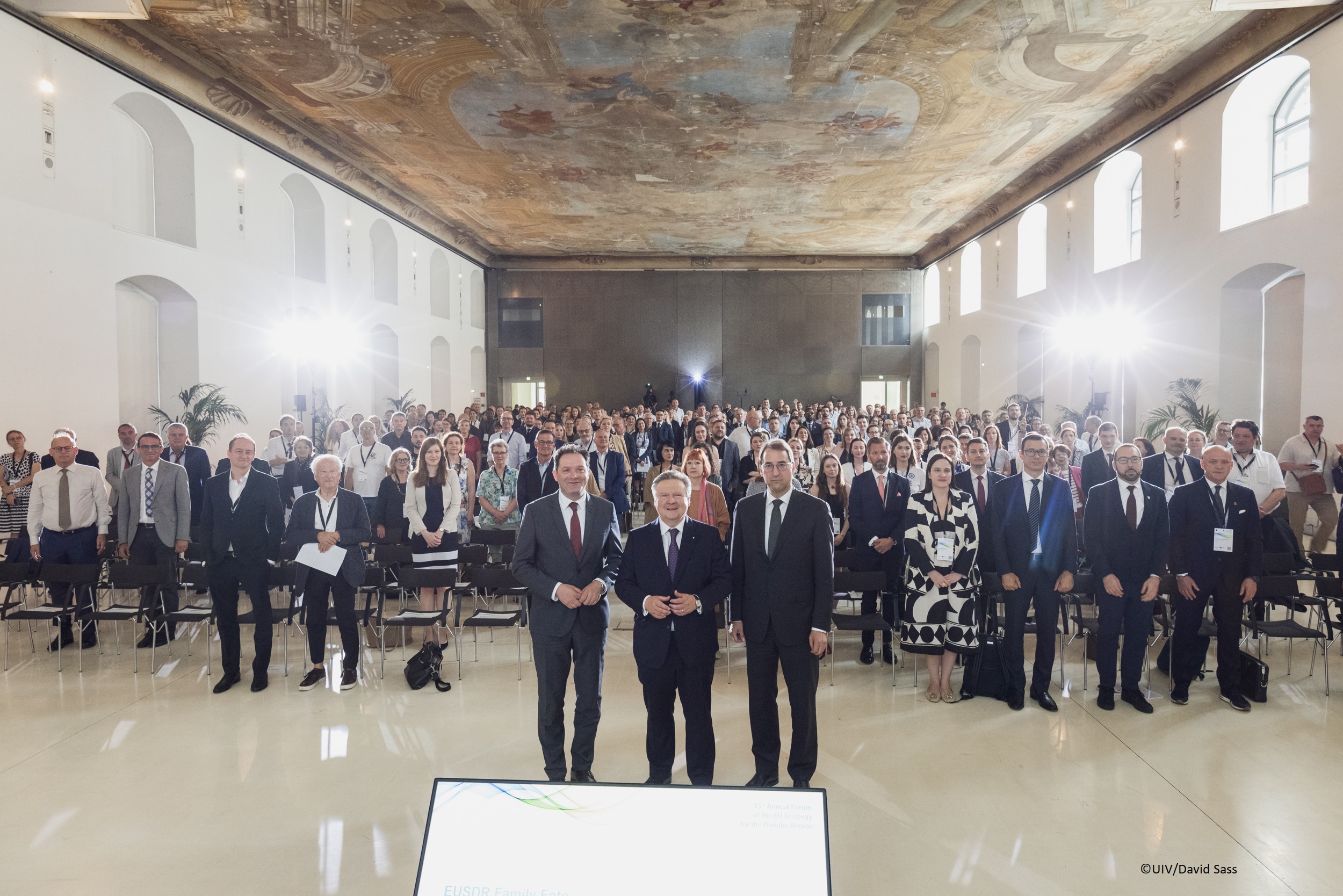The 13th edition of the EUSDR Annual Forum took place in Vienna, on 20 – 21 June 2024, offering a cooperation platform for stakeholders from the Region and beyond to address upcoming challenges, collaborate on shared solutions, and develop aspirations for a prosperous future.
Organised by the Austrian Presidency of the EU Strategy for the Danube Region in cooperation with the European Commission and the Danube Strategy Point, together with the City of Vienna as the host city, the event gathered 430 participants on site and 100 speakers on site and online.
The 2-day event’s agenda reflected the Austrian Presidency’s thematic priorities, which encompass contributing to stability and security, fostering innovation, skills, and business opportunities, and enhancing the ecosystem, water, and green transition management in the Danube Region.
With the support of the European Commission, the Annual Forum also provided the opportunity for the journalists present at the event to get familiarised with the general aim and specific targets and actions of the Danube Region Strategy. This information was highlighted during a press conference with the assistance of Alexander Schallenberg, the Federal Minister for European and International Affairs of Austria, Norbert Totschnig, the Federal Minister for Agriculture, Forestry, Regions and Water Management of Austria, and Michael Ludwig, the Mayor and Governor of Vienna.
The first major topic on the agenda addressed the diversity and integration in the Danube Region, marked by its cultural diversity and dynamic history, and its multifaceted regions and cities. With climate change and geopolitical shifts, cooperation in the region is crucial to build a strong future. Distinguished guests from EU, national, and regional levels discussed the potential and opportunities for cooperation in the Danube Region, highlighting the importance of the Danube Region Strategy in promoting development and prosperity.
Recognising the key role that the cities in the Danube Region play in driving social, cultural, economic, and ecological advancements, the Austrian EUSDR Presidency focuses on how the Danube Region Strategy directly impacts citizens, by enhancing roles and capacities for regions, cities and municipalities. This approach was materialised into a novelty on the agenda of the Annual Forum: A Mayors’ talk: Cities as transformation hubs of the Danube Region, featuring the mayors of Vienna, Sofia, Zagreb, Chisinau, Budapest, Sarajevo, and Odessa, who debated on how collaborative strategies, such as EUSDR enhance the resilience of the capitals of the Danube Region in a competitive urban environment.
As responding to the climate crisis is crucial for all aspects of society, another major topic on the Forum’s agenda related to the importance of green transition, involving transformation and creating opportunities. The keynote speakers presented lessons from climate research and the importance of shifting to renewable energy sources, circular economy practices and sustainable waterway mobility.
Eight parallel sessions, hosted by representatives of the EUSDR Priority Areas or other stakeholders set the scene for interactive discussions, on climate change & adaptation, water & ecology and sustainable economy. Participants engaged in a thorough discussion on the strengths, weaknesses, opportunities, and threats associated with the topic, with the guidance of experts’ insights and practical examples. The groups, with the assistance of experts from EU funding programs, delved into potential solutions and successful approaches to address the specific challenges at hand. The interactive sessions aimed to establish a common understanding of the challenges and opportunities, as well as to build partnerships among stakeholders with similar interests under the EU Strategy for the Danube Region.
The final subject discussed during the day centred on geopolitics, stability, prosperity, and future outlooks in the Danube Region. This was arranged as a high-level dialogue, welcoming ministers, policymakers, and respectful experts. The discussion underscored the prospects of the Danube Region, considering the current period of significant change. Strategic imperatives, regional trends, obstacles, and economic possibilities were examined, with a focus on identifying common strategies for a thriving and stable Danube Region.
In line with the political objective of the Austrian EUSDR Presidency of strengthening political commitment and broad ownership of EUSDR, the Ministerial Meeting organised back-to-back with the Annual Forum, brought around the table the Danube Foreign Ministers who jointly signed a political declaration: Vienna Danube Declaration. Despite the geopolitical context and increasing challenges in the Danube Region – systemic and security threats, including the disruptive influence of external actors, hybrid threats, and disinformation – the EUSDR countries reaffirmed their determination to stand together and enhance cooperation in the Danube Region, which is seen as a cornerstone of security, stability, and prosperity.

The second day of the event started with a structured discussion about future frameworks for cooperation in the Danube Region, offering valuable insights into the EUSDR’s work on the post-2027 period and the new EU Cohesion Policy. The session sought to foster a forward-thinking exchange by incorporating perspectives from institutions, research, project stakeholders, and the youth’s vision for the region. These insights paved the way for an open conversation on future action areas and required activities, with guiding questions on cooperation frameworks, conditions, stakeholders, and tools.
Aiming for dynamic engagement and involvement, the final session on the agenda encouraged attendees to take part in a World Café dialogue focusing on visions and concepts for collaboration in the Danube Region. Gathered around tables, key stakeholders in the Danube Region, including EUSDR Priority Areas and funding instruments, led discussions centred on the above-mentioned guiding questions. Everyone was welcomed to contribute, viewing this format as an opportunity to engage in future discourse and take away valuable insights.
The 13th edition of the EUSDR Annual Form concluded with key insights for the future of the Danube Region from experts’ viewpoints and an offer for participants to discover significant sites in and around Vienna, closely associated with the Danube River and the Danube Region, through participation in five guided tours.
***
Photos from the event are available in the Photo Gallery.
Presentations from the sessions (not all speakers provided a written presentation):
The Danube Region: Diversity and integration
Green Transition: shaping transformation, creating opportunities
Session 3 _Reindustrialisation
Session 7_Skills and education
Future perspectives for a fruitful cooperation in the Danube Region





